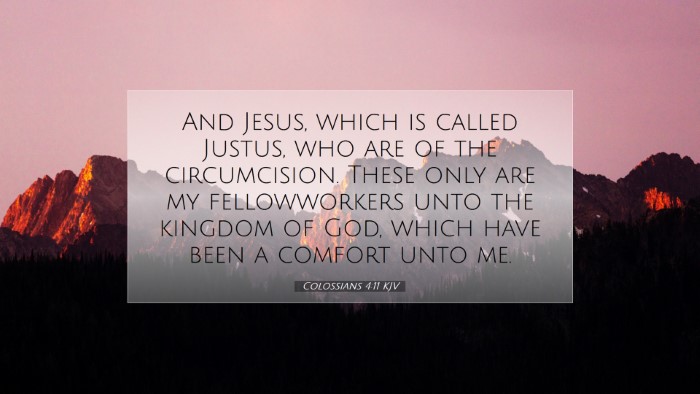Old Testament
Genesis Exodus Leviticus Numbers Deuteronomy Joshua Judges Ruth 1 Samuel 2 Samuel 1 Kings 2 Kings 1 Chronicles 2 Chronicles Ezra Nehemiah Esther Job Psalms Proverbs Ecclesiastes Song of Solomon Isaiah Jeremiah Lamentations Ezekiel Daniel Hosea Joel Amos Obadiah Jonah Micah Nahum Habakkuk Zephaniah Haggai Zechariah MalachiColossians 4:11
Colossians 4:11 KJV
And Jesus, which is called Justus, who are of the circumcision. These only are my fellowworkers unto the kingdom of God, which have been a comfort unto me.
Colossians 4:11 Bible Commentary
Commentary on Colossians 4:11
Verse Context: Colossians 4:11 states, "And Jesus, who is called Justus, these are the only men of the circumcision among my fellow workers for the kingdom of God, and they have been a comfort to me." This verse is situated in Paul’s concluding remarks, where he is acknowledging his companions in ministry, specifically highlighting their Jewish background and their contributions to the early Church.
Overview and Analysis
This epistle serves as an essential guide for understanding Christian doctrine and ethics. Paul in this passage emphasizes both the unity of the Church and the role of its members in the ministry of the gospel. The camaraderie among believers, expressed in this verse, underscores the importance of fellowship and mutual support in advancing God's kingdom.
Insights from Public Domain Commentaries
Matthew Henry
According to Matthew Henry, the mention of Jesus called Justus is significant because it reflects the diversity and inclusion present within the early Church. Henry comments that the term "Justus" indicates a person who is just or righteous, emphasizing that moral uprightness is vital among those working for the kingdom. He further elucidates the fact that these men were of the circumcision, indicating their Jewish heritage, which adds depth to their role in proclaiming Christ as the fulfillment of Jewish tradition.
Albert Barnes
Albert Barnes adds that the companions mentioned by Paul are an illustration of the importance of having dedicated partners in ministry. He remarks that their contribution to the work of the gospel is a source of comfort to Paul, thus highlighting the substantial role of fellowship. Barnes emphasizes that their support symbolizes the shared responsibility of believers in spreading the message of Christ, each member bringing unique strengths to the ministry.
Adam Clarke
Adam Clarke points out that Paul’s acknowledgment of “the only men of the circumcision” suggests a certain exclusivity, as they represented Jewish believers who were fully engaged in the work of the Church. Clarke argues that this signifies the bridging of gaps between different cultural backgrounds within the body of Christ, portraying the community of believers as inclusive and diverse. He also mentions the comfort provided by these individuals, suggesting that such comfort comes from a shared mission and collective effort to advance God’s work in a challenging context.
Theological Implications
The theological reflections derived from Colossians 4:11 invite a deeper examination of community within the Church. Several key implications can be drawn:
- Unity in Diversity: The inclusion of Jewish believers in Gentile missions emphasizes the unity that transcends cultural differences, reminding modern readers that the Body of Christ is formed by diverse individuals working towards a common goal.
- Mutual Support: The concept of comfort here is not merely emotional but speaks to the support system available among believers, reflecting a model for contemporary church dynamics.
- Importance of Fellowship: The communal aspect of ministry underlines the necessity for collaboration among believers, suggesting that effective ministry often flourishes within a shared context of brotherhood and support.
- Encouragement to Fellow Workers: Paul’s mention serves to encourage fellow workers in ministry that their contributions, no matter how small, are valued and essential in God’s plan.
Practical Applications
In light of the insights gathered from these commentaries, there are several practical applications for pastors, students, and theologians:
- Emphasize Collaboration: Encourage the development of ministry teams that consist of individuals from varying backgrounds and experiences to enrich the church’s outreach efforts.
- Foster Inclusivity: Create environments where all believers feel valued and included, reflecting the inclusive nature seen in the early Church as exemplified by Paul.
- Build a Supportive Community: Recognize the integral role of mutual support in ministry; churches should cultivate practices that encourage prayer, accountability, and shared mission-oriented goals.
- Highlight Personal Contributions: Acknowledge and celebrate the efforts of those working behind the scenes in ministry as oftentimes, their work is foundational to the visible fruit of the church’s labor.
Conclusion
Colossians 4:11 reinforces the significance of collaborative ministry and the importance of recognizing the contributions of all believers within the Christian community. The insights from Matthew Henry, Albert Barnes, and Adam Clarke provide a robust framework for understanding the relational dynamics within the Church, urging believers today to reflect on their roles as both individual and collective instruments of God’s grace.


